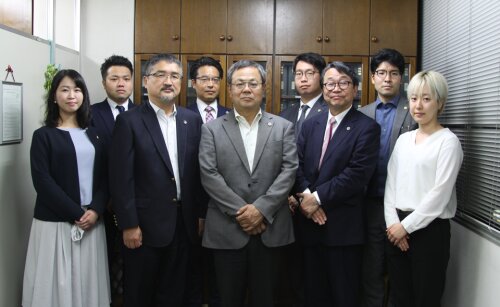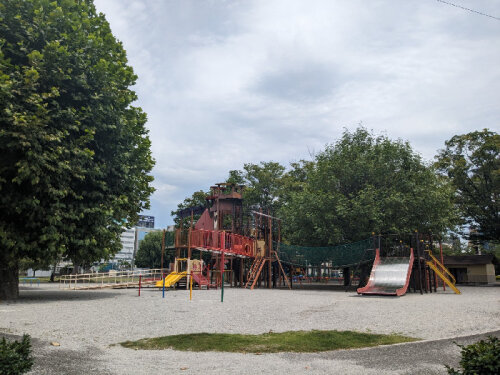Best Workers Compensation Lawyers in Shizuoka
Share your needs with us, get contacted by law firms.
Free. Takes 2 min.
List of the best lawyers in Shizuoka, Japan
About Workers Compensation Law in Shizuoka, Japan
Workers compensation in Japan is governed primarily by national laws that apply across all prefectures, including Shizuoka. The core framework is the Industrial Accident Compensation Insurance system, commonly called workers' accident compensation insurance. The system provides benefits for employees who suffer injuries, illnesses, disabilities, or death caused by work or commuting to and from work. Benefits can include payment for medical treatment, compensation for lost wages while recovering, disability compensation when an injury causes lasting impairment, and survivors benefits if a worker dies as a result of a work-related event.
Although the laws are national, administration is handled locally through Labour Standards Inspection Offices and related agencies. If you are injured or fall ill because of your job in Shizuoka, you interact with local institutions for reporting, filing claims, and resolving disputes. Employers also have legal obligations to report serious accidents and to cooperate with the claims process.
Why You May Need a Lawyer
Many workers are able to obtain benefits through the routine claims process. However, legal help is often necessary in situations where facts are disputed, a claim is denied or delayed, or the employer fails to fulfill legal duties. A lawyer can help protect your rights, explain legal options, and represent you in appeals, mediation, or court. Common scenarios where legal assistance can be especially important include:
- Denial of benefits because the insurer or employer disputes whether the injury or illness is work-related.
- Disputes about the severity of injury or the level of disability for compensation purposes.
- Employer refusal to report the accident or to cooperate with filing a claim.
- Complex cases such as occupational diseases, cumulative trauma, or mental health conditions caused by workplace stress or harassment.
- Cases involving commuting accidents that require proof of the commute route and purpose.
- When you need both workers' compensation benefits and additional civil claims against third parties or the employer for negligence.
- Long delays in payment or interruption of benefits that affect your livelihood.
- Assistance for non-Japanese speakers to ensure communications and documents are handled correctly.
Local Laws Overview
Key legal instruments and local features relevant in Shizuoka include the Industrial Accident Compensation Insurance scheme and the Labour Standards Act. These laws require employers to subscribe to the insurance and to provide certain protections and reporting of workplace accidents. Important local elements to keep in mind are:
- Administration and enforcement: Local Labour Standards Inspection Offices are responsible for receiving accident reports, guiding claim procedures, and enforcing employer obligations. Shizuoka has several Labour Standards offices covering different cities and districts. These offices can investigate serious accidents and take administrative action against employers who violate safety or reporting duties.
- Benefit types: The main benefits provided are medical treatment coverage, compensation for time off work, disability compensation, rehabilitation assistance, and survivors benefits. The exact calculation and eligibility are governed by national rules but applied by local offices.
- Employer obligations: Employers must maintain safe working conditions, report serious workplace accidents to the Labour Standards Inspection Office, and cooperate with the insurance claim. Failure to do so can lead to administrative penalties and may strengthen a worker's case when benefits are contested.
- Reporting and documentation: You should report injuries to your employer promptly and seek medical treatment. Keep careful records of medical certificates, hospital receipts, employment records, time sheets, and any communications with the employer. These documents are critical when filing or appealing a claim.
- Mental and cumulative injury recognition: Cases involving psychological harm, repeated strain, or illnesses that develop over time can be more difficult to prove as work-related. Local offices apply national standards but will examine medical evidence, work history, and the conditions that caused or contributed to the illness.
- Dispute resolution: If a claim is denied or contested, there are administrative remedies through Labour Standards Inspection Offices and appeal procedures. Mediation and civil litigation are also options. Lawyers provide representation at all these stages.
Frequently Asked Questions
What should I do immediately after a workplace injury in Shizuoka?
Get medical attention first. Inform your employer or supervisor about the injury as soon as possible and request that they start the workers' compensation claim process. Keep copies of medical reports, receipts, and documentation of the incident, including photos and witness names. If the employer does not cooperate, contact the local Labour Standards Inspection Office for guidance.
How do I know if my injury qualifies as work-related?
An injury or illness is generally considered work-related if it was caused by or occurred during the course of work or commuting to and from work. Assessment depends on medical evidence, the activity being performed when the event occurred, and whether the work materially contributed to the condition. Complex or cumulative conditions often require detailed documentation and expert medical opinions.
Who pays for my medical treatment after a work injury?
Under the workers' accident compensation system, medical treatment for a recognized work-related injury or illness is covered by the insurance. You should inform the treating medical institution that the injury is work-related so that treatment can be billed through the workers' compensation system rather than under personal health insurance. If you pay upfront, keep all receipts to claim reimbursement.
What if my employer refuses to file a claim or admits the injury?
If an employer refuses to acknowledge the injury or to file a claim, contact the local Labour Standards Inspection Office. The office can advise you on filing a claim independently and can investigate employer obligations. A lawyer can assist in pressing the claim and pursuing remedies against a non-cooperative employer.
How long will it take to receive benefits?
Processing times vary depending on the complexity of the case and whether liability is contested. Simple, accepted claims may be processed relatively quickly. Cases that require investigation, additional medical evidence, or appeals can take much longer. If payments are delayed, contact the insurer, the Labour Standards Inspection Office, or a lawyer to find out why and to seek interim relief if necessary.
Can I get compensation if the injury happened while commuting?
Yes. The insurance covers many commuting accidents, but eligibility depends on whether the commute was reasonable and directly connected to starting or finishing work or necessary work duties. Commuting routes and purposes may be examined carefully, so record details such as time, route, and purpose of travel.
What if my injury leads to long-term disability or my family needs survivors benefits?
The system provides disability compensation and pension benefits for workers who sustain lasting impairments, and survivors benefits if a worker dies from a work-related cause. The amount and type of benefit depend on the degree of disability or relationship of survivors. These cases require thorough medical documentation and often legal assistance to secure the correct classification and calculation of benefits.
Can I sue my employer in addition to claiming workers' compensation?
Workers' compensation is generally intended to be the primary remedy for work-related injuries, but in some circumstances you may have additional civil claims. For example, if employer negligence or intentional wrongdoing caused the injury, or a third party is liable, you may bring a civil action seeking damages not covered by the insurance. Consult a lawyer to understand options and how a civil suit may affect insurance benefits.
What if I am a part-time, temporary, or foreign worker in Shizuoka?
Most employees working under an employment relationship are covered by the workers' accident compensation system regardless of full-time or part-time status. Foreign workers are also entitled to benefits, but language or documentation barriers can complicate the process. Seek assistance from the Labour Standards Inspection Office, local support services for foreign residents, or a lawyer with experience in assisting non-Japanese speakers.
How can a lawyer help in a workers' compensation case?
A lawyer can help gather and preserve evidence, prepare and file appeals, represent you in administrative hearings or court, negotiate settlements, and advise on civil claims that may run alongside insurance benefits. They also help interpret benefit calculations, challenge denials, and ensure compliance with deadlines and procedural requirements.
Additional Resources
When seeking help in Shizuoka, consider the following types of organizations and offices that provide information, support, or legal assistance:
- Local Labour Standards Inspection Office in Shizuoka or the office that covers your municipality. These offices handle accident reports, guidance, and enforcement.
- Ministry of Health, Labour and Welfare for general national information on workers' accident compensation and official procedures.
- Japan Legal Support Center - the public legal aid organization that provides consultation and can assist with referrals to lawyers and legal aid funding.
- Local bar association legal consultation services, which often run free or low-cost consultation days for initial advice.
- Hello Work and municipal welfare offices for employment support and social welfare guidance if loss of income creates financial hardship.
- Non-profit organizations and community groups that assist foreign residents, if language support is needed.
When you contact these resources, ask whether bilingual or translation services are available if you do not speak Japanese.
Next Steps
If you need legal assistance for a workers' compensation matter in Shizuoka, follow these practical steps:
- Seek immediate medical treatment and obtain complete medical records and certificates that describe the injury and recommended treatment.
- Notify your employer in writing about the incident and request that they initiate the workers' compensation claim. Keep copies of all communications.
- Collect and preserve evidence: photos of the scene, witness names and statements, time logs, pay slips, employment contract, and any communications with your employer or insurer.
- Contact your local Labour Standards Inspection Office for guidance on filing a claim and to report employer non-cooperation if applicable.
- If benefits are denied, delayed, or the work-related nature is disputed, consult a lawyer who specializes in labor and social insurance law. Ask about fee arrangements, experience with workers' compensation cases, and whether they handle appeals and civil suits.
- Consider contacting the Japan Legal Support Center or your local bar association for an initial consultation or referral, especially if cost is a concern.
- If you are a foreign national, seek language support early and inform authorities or counsel about any visa or employment status concerns that could affect your situation.
Taking prompt, well-documented steps and getting proper legal advice will improve your chances of securing the benefits and protections to which you are entitled under the workers' accident compensation system in Shizuoka.
Lawzana helps you find the best lawyers and law firms in Shizuoka through a curated and pre-screened list of qualified legal professionals. Our platform offers rankings and detailed profiles of attorneys and law firms, allowing you to compare based on practice areas, including Workers Compensation, experience, and client feedback.
Each profile includes a description of the firm's areas of practice, client reviews, team members and partners, year of establishment, spoken languages, office locations, contact information, social media presence, and any published articles or resources. Most firms on our platform speak English and are experienced in both local and international legal matters.
Get a quote from top-rated law firms in Shizuoka, Japan — quickly, securely, and without unnecessary hassle.
Disclaimer:
The information provided on this page is for general informational purposes only and does not constitute legal advice. While we strive to ensure the accuracy and relevance of the content, legal information may change over time, and interpretations of the law can vary. You should always consult with a qualified legal professional for advice specific to your situation.
We disclaim all liability for actions taken or not taken based on the content of this page. If you believe any information is incorrect or outdated, please contact us, and we will review and update it where appropriate.











